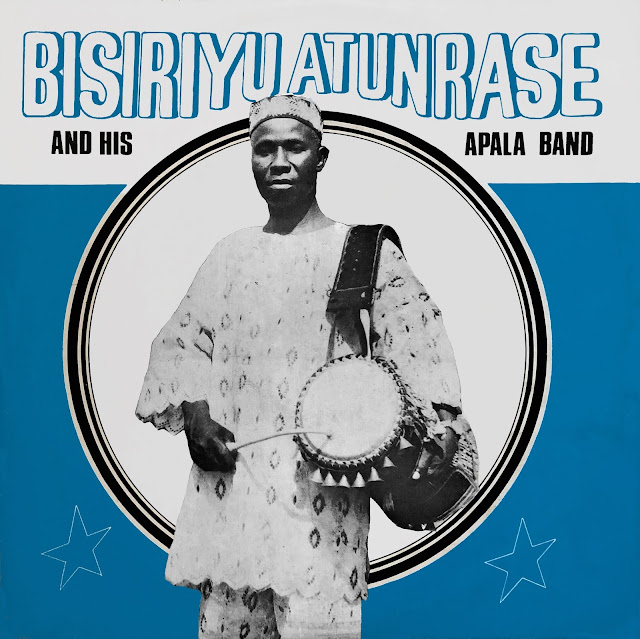NIGERIA – NIGÉRIA
Bisiriyu Atunrase & His Apala Band – Star Records SRPS 45 (LP)
Heartfelt thanks to our friend João, who discovered this ultra-rare disc of music by Bisiriyu Atunrase, a forgotten Apala master. Except for two 7-inch recordings from the early 1960s posted on Youtube (1), I could find nothing out about him (if anyone has information, please let me know!). Judging from the album cover, this bandleader and vocalist also played the gangan talking drum. This disc was recorded on the label Star Records—the same label that released over 20 LPs by Haruna Isahola, the King of Apala—sometime in the 1970s. On this record, Atunrase and his group craft the kind of deep, raw, and mellifluous Apala music that expresses the heart of Yoruba culture and identity.
Our other Yoruba Apala shares:
Haruna Ishola & His Apala Group – Star Records SRPS 31 here
Haruna Ishola & His Apala Group – Star Records SRPS 32 here
Haruna Ishola & His Apala Group – RPS 16 here
Ayinla Owomura & His Apala Group – 25 x 40 – Africa Song Ltd NEMI 0515 here
Ayinla Omowura & His Apala Group – His Master's Voice Vol. 2 – HNLX 5085 here
Moufa Laif – Yoruba Apala Music from Porto Novo, Benin here
The Onalemole, the Ifa priest of Alaafin of Oyo, with other babalawo diviners, during a divination session.
The Ifa divination system was inscribed on the List of Intangible Cultural Heritage of Humanity in 2008.
“The Ifa divination system, which makes use of an extensive corpus of texts and mathematical formulas, is practiced among Yoruba communities and by the African diaspora in the Americas and the Caribbean. The word Ifa refers to the mystical figure Ifa or Orunmila, regarded by the Yoruba as the deity of wisdom and intellectual development.
In contrast to other forms of divination in the region that employ spirit mediumship, Ifa divination does not rely on a person having oracular powers but rather on a system of signs that are interpreted by a diviner, the Ifa priest or babalawo, literally 'the priest’s father.' The Ifa divination system is applied whenever an important individual or collective decision has to be made.
The Ifa literary corpus, called odu, consists of 256 parts subdivided into verses called ese, whose exact number is unknown as they are constantly increasing (there are around 800 ese per odu). Each of the 256 odu has its specific divination signature, which is determined by the babalawo using sacred palm-nuts and a divination chain. The ese, considered the most important part of Ifa divination, are chanted by the priests in poetic language. The ese reflect Yoruba history, language, beliefs, cosmovision and contemporary social issues. The knowledge of Ifa has been preserved within Yoruba communities and transmitted among Ifa priests.”*
*Unesco here
Please help me purchase important traditional records to pursue my global
curation project and share the best finds with you on this blog:





No comments:
Post a Comment